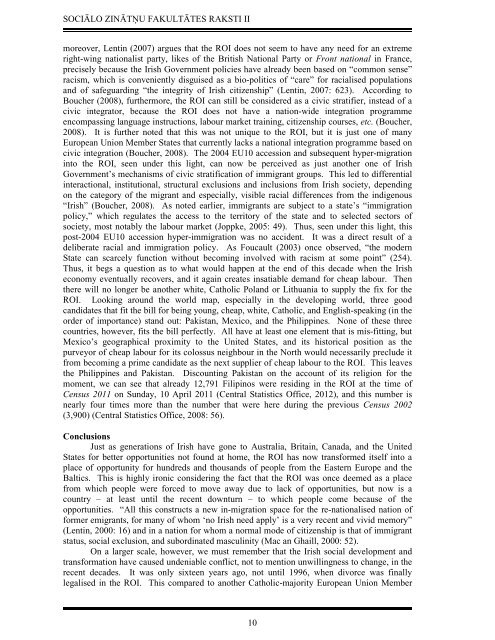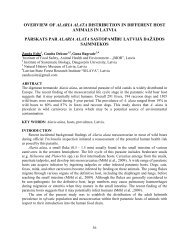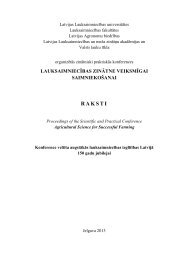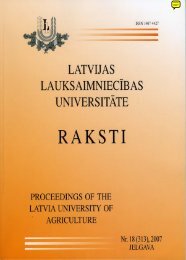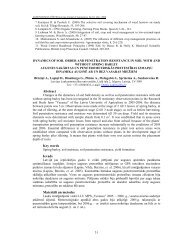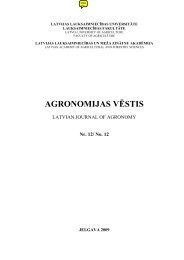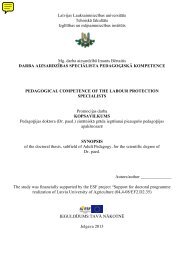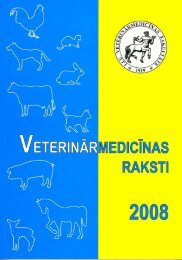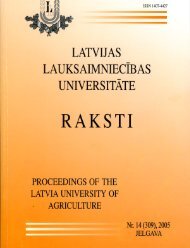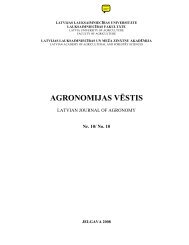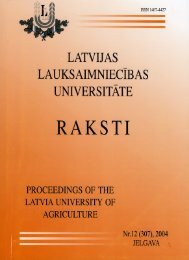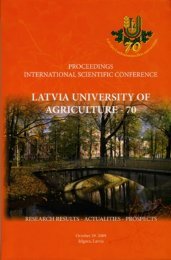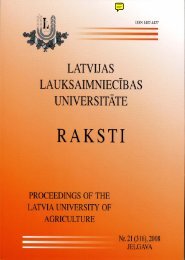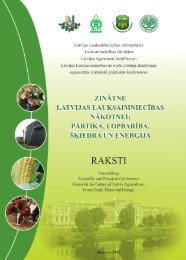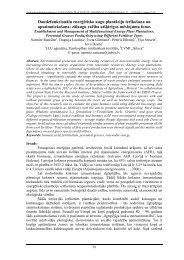Raksti II - LLU FundamentÄlÄ bibliotÄka - Latvijas LauksaimniecÄ«bas ...
Raksti II - LLU FundamentÄlÄ bibliotÄka - Latvijas LauksaimniecÄ«bas ...
Raksti II - LLU FundamentÄlÄ bibliotÄka - Latvijas LauksaimniecÄ«bas ...
Create successful ePaper yourself
Turn your PDF publications into a flip-book with our unique Google optimized e-Paper software.
SOCIĀLO ZINĀTŅU FAKULTĀTES RAKSTI <strong>II</strong>I<br />
moreover, Lentin (2007) argues that the ROI does not seem to have any need for an extreme<br />
right-wing nationalist party, likes of the British National Party or Front national in France,<br />
precisely because the Irish Government policies have already been based on “common sense”<br />
racism, which is conveniently disguised as a bio-politics of “care” for racialised populations<br />
and of safeguarding “the integrity of Irish citizenship” (Lentin, 2007: 623). According to<br />
Boucher (2008), furthermore, the ROI can still be considered as a civic stratifier, instead of a<br />
civic integrator, because the ROI does not have a nation-wide integration programme<br />
encompassing language instructions, labour market training, citizenship courses, etc. (Boucher,<br />
2008). It is further noted that this was not unique to the ROI, but it is just one of many<br />
European Union Member States that currently lacks a national integration programme based on<br />
civic integration (Boucher, 2008). The 2004 EU10 accession and subsequent hyper-migration<br />
into the ROI, seen under this light, can now be perceived as just another one of Irish<br />
Government’s mechanisms of civic stratification of immigrant groups. This led to differential<br />
interactional, institutional, structural exclusions and inclusions from Irish society, depending<br />
on the category of the migrant and especially, visible racial differences from the indigenous<br />
“Irish” (Boucher, 2008). As noted earlier, immigrants are subject to a state’s “immigration<br />
policy,” which regulates the access to the territory of the state and to selected sectors of<br />
society, most notably the labour market (Joppke, 2005: 49). Thus, seen under this light, this<br />
post-2004 EU10 accession hyper-immigration was no accident. It was a direct result of a<br />
deliberate racial and immigration policy. As Foucault (2003) once observed, “the modern<br />
State can scarcely function without becoming involved with racism at some point” (254).<br />
Thus, it begs a question as to what would happen at the end of this decade when the Irish<br />
economy eventually recovers, and it again creates insatiable demand for cheap labour. Then<br />
there will no longer be another white, Catholic Poland or Lithuania to supply the fix for the<br />
ROI. Looking around the world map, especially in the developing world, three good<br />
candidates that fit the bill for being young, cheap, white, Catholic, and English-speaking (in the<br />
order of importance) stand out: Pakistan, Mexico, and the Philippines. None of these three<br />
countries, however, fits the bill perfectly. All have at least one element that is mis-fitting, but<br />
Mexico’s geographical proximity to the United States, and its historical position as the<br />
purveyor of cheap labour for its colossus neighbour in the North would necessarily preclude it<br />
from becoming a prime candidate as the next supplier of cheap labour to the ROI. This leaves<br />
the Philippines and Pakistan. Discounting Pakistan on the account of its religion for the<br />
moment, we can see that already 12,791 Filipinos were residing in the ROI at the time of<br />
Census 2011 on Sunday, 10 April 2011 (Central Statistics Office, 2012), and this number is<br />
nearly four times more than the number that were here during the previous Census 2002<br />
(3,900) (Central Statistics Office, 2008: 56).<br />
Conclusions<br />
Just as generations of Irish have gone to Australia, Britain, Canada, and the United<br />
States for better opportunities not found at home, the ROI has now transformed itself into a<br />
place of opportunity for hundreds and thousands of people from the Eastern Europe and the<br />
Baltics. This is highly ironic considering the fact that the ROI was once deemed as a place<br />
from which people were forced to move away due to lack of opportunities, but now is a<br />
country – at least until the recent downturn – to which people come because of the<br />
opportunities. “All this constructs a new in-migration space for the re-nationalised nation of<br />
former emigrants, for many of whom ‘no Irish need apply’ is a very recent and vivid memory”<br />
(Lentin, 2000: 16) and in a nation for whom a normal mode of citizenship is that of immigrant<br />
status, social exclusion, and subordinated masculinity (Mac an Ghaill, 2000: 52).<br />
On a larger scale, however, we must remember that the Irish social development and<br />
transformation have caused undeniable conflict, not to mention unwillingness to change, in the<br />
recent decades. It was only sixteen years ago, not until 1996, when divorce was finally<br />
legalised in the ROI. This compared to another Catholic-majority European Union Member<br />
10


